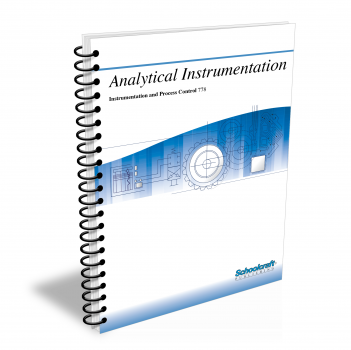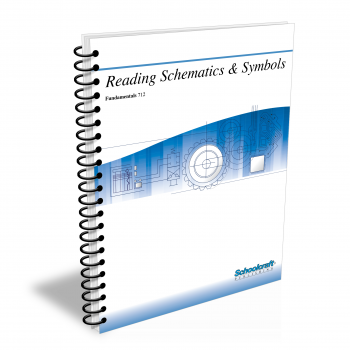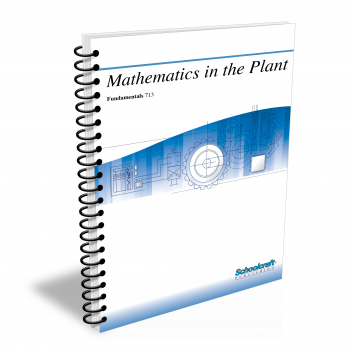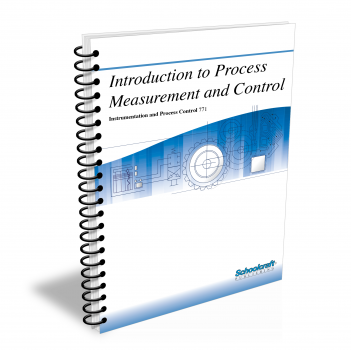Analytical Instrumentation

Course Number: 778
The Analyticsl Instrumentation textbook discusses the principles, installation, calibration, and maintenance of conductivity probes, and the methods of stack-gas monitoring. It defines pH and ORP and explains how to install, calibrate, and maintain typical pH and ORP measurement instruments. It describes the operation, installation, calibration, and maintenance of several optical analyzers. It explains the principles and safe practices governing sensors used in measuring oxygen, carbon monoxide, carbon dioxide, and other products of combustion. The textbook concludes by explaining the operation, calibration, and system components in liquid and gas chromatography.
Does your curriculum require additional topics not included in this textbook? Build a customized version of the Analytical Instrumentation textbook below.
This textbook has been recently updated
to include topics lists, objectives, & key terms for every chapter.
Recommended Contact Hours – 8
Preview a Chapter
Available Supporting Material
- Table of Contents
- Exam Copies
- Suggested Titles
Table of Contents
Chapter 1: Measuring Conductivity
Topics: Ion concentration; Conductivity probes; Probe, liquid standard, and wire loop calibration; Grab samples; Stack gas analyzers; Maintenance
Learning Objectives:
- Define conductivity and discuss the basic principles governing conductivity.
- Compare the operation of electrode probes and inductive probes.
- Describe two procedures for calibrating conductivity probes.
- Discuss proper installation and maintenance practices for conductivity probes.
- Discuss the operation of stack gas analyzers.
Chapter 2: Measuring pH and ORP
Topics: Temperature and pH; pH and ORP reference and measurement electrodes; Calibration; Probe installation, mounts, and maintenance
Learning Objectives:
- Describe pH and ORP measurement processes.
- Describe the instruments used for the measurement of pH and ORP.
- Discuss calibration procedures for pH and ORP measurement instruments.
- Discuss general installation and maintenance procedures for pH and ORP measurement instruments.
Chapter 3: Optical Measurements
Topics: Transmission-type analyzers; Turbidimeter; Nephelometers; Refractometers; Capacity analyzers; Calibration, installation, and maintenance
Learning Objectives:
- Describe the components that make up an optical analyzer.
- Discuss the basic operating procedures of silica ion and COD optical analyzers, turbidimeters and nephelometers, refractometers, and capacity analyzers.
- Compare procedures for calibrating an optical analyzer with standards, with grab samples, and electronically.
- Discuss installation considerations and basic maintenance procedures for an optical analyzer.
Chapter 4: Measuring Products of Combustion
Topics: Gas, oxygen, carbon dioxide, and carbon monoxide sensors; Calibration; Maintenance
Learning Objectives:
- Identify the main components in the combustion process.
- Describe the various kinds of instruments used for measuring the products of combustion.
- Discuss the principles of operation of instruments that measure the products of combustion.
- Describe the basic maintenance procedures for instruments that measure the products of combustion.
- Discuss the various sampling techniques for measuring the products of combustion.
Chapter 5: Chromatography
Topics: Chromatograph operation; Gas and liquid chromatography; System valves; Detectors; Chromatograms; Calibration and maintenance
Learning Objectives:
- Discuss the principles of chromatograph operation.
- Describe four kinds of detectors used with chromatographs.
- Describe four kinds of liquid chromatographs.
- Explain how to read a chromatogram.
- Discuss chromatograph calibration techniques and identify variables that can affect chromatograph accuracy.
- Discuss chromatograph maintenance considerations.
Request Exam Copies
Exam Copies
Ready to see a copy of our textbooks? After selecting which textbooks you’d like to review for your course, you can submit your request by either logging in or creating an account so we know where to ship your exam copies. A representative from Schoolcraft will contact you to confirm and finish processing your request.
Exam copies are always free and yours to keep.
Selected Exam Copies
none selected
* Maximum of five copies can be ordered


